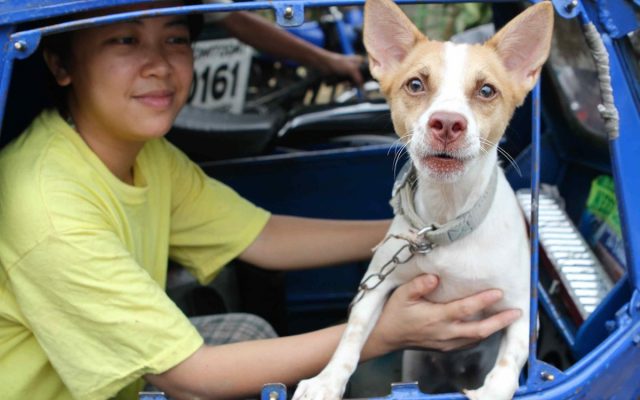MANILA – The Philippine Animal Welfare Society (PAWS) is reminding the public that it is unsafe to eat dog meat, which has been documented to transmit rabies, a disease that has led to the deaths of people who have consumed it.
This statement was prompted by a letter posted by parent Chuck Torres on Facebook on Thursday last week, where representatives from his son’s school sought his permission for the consumption of dog meat and locally-made beer during a field trip to Baguio City.
“Dog meat is not certified safe,” said PAWS executive director Anna Cabrera in a phone interview with InterAksyon on Saturday. “Dog meat has never been registered or accredited by the National Meat Inspection Service as safe for human consumption. It has always been hot meat… at the same level as ‘botcha’, ‘yung mga double-dead natin, na hindi pinapakain sa tao. ‘Di ba, namatay na tapos kinatay pa. Hindi mo pwedeng i-serve sa tao (those double dead meat which isn’t served to people. The animal already died, and after that, you butcher it for meat. You cannot serve that to people).”
Aside from that, she said, killing dogs under such circumstances is against the Animal Welfare Act of 1998.
Only in the following instances is it not illegal to kill a dog, as the law states:
1. When it is done as part of the religious rituals of an established religion or sect or ritual required by ethnic custom of indigenous cultural communities: however, leaders shall keep records in cooperation with the Committee on Animal Welfare;
2. When the pet animal is afflicted with an incurable communicable disease as determined and certified by a duly licensed veterinarians\;
3. When the killing is deemed necessary to put an end to the misery suffered by the animal as determined and certified by a duly licensed veterinarian;
4. When it is done to prevent an imminent danger to the life or limb of a human being; and
5. When done for the purpose of animal population control;
6. When animal is killed after it has been used in authorized research or experiments; and
7. Any other ground analogous to the foregoing as determined and certified by a licensed veterinarian.
The trade of dog meat is also a crime under the Anti-Rabies Act of 2007, said Cabrera.
“The dog meat trade is prohibited, so if they [the school] bought it, or are part of buying it… the school is party to this crime. And if the kids are being asked to buy it from the [vendor], they’re party to the crime as well,” she elaborated.
As for the consumption of dog meat supposedly being part of Baguio City’s culture, Cabrera explained, “(W)hile there is an exemption in the Animal Welfare Act for indigenous peoples’ rituals or tribal ceremonies, these are specific rituals. And you know, even for the people in the Cordilleras, the Igorots and the like, their rituals are very specific. There are only certain circumstances where dog-killing is allowed. Like one, when a husband reunites with his wife… When a warrior comes home triumphant from something, things like that. So the kinds of dog-eating that they do in that region wherein it is sold together with that alcoholic beverage… is something that is not cultural at all. It’s something that doesn’t fall within the exemption. So it is actually a crime.”
“Did the school not even think that there was a risk?” she added. “If those children end up down with rabies or other zoonotic disease na nakuha nila from that meat, hindi na natakot ‘yung school (that they got from that meat, didn’t the school think to be scared)?”
Cabrera was glad to note that when she talked to Torres after reporting the proposed activity, she was told that the school decided not to push through with the eating of dog meat and drinking of locally-made beer after he complained to them.
“When you’re an educational institution, you have a higher standard by which you are judged,” she said. “If it’s an ordinary person that waylays our youth, that may be okay. It’s slightly more acceptable. But if you’re an educational institution that’s supposed to [promote] morals, and you’re making them drink beer, it’s like, wow, what’s that right? And with dog meat, you know that it’s illegal, unless you’ve been living under a rock all these years.”
She encouraged schools to exercise prudence and a higher sense of responsibility.
“Our young people are anchored on them. In terms of formation, in terms of ethics, they mold our children, and if they themselves cannot guide themselves properly, how will we ever hope that they will give the right information to our kids?” Cabrera asked.
She said PAWS is working hard to include animal welfare in the school curriculum, and had in fact been lobbying for this for a long time. Cabrera added that the Department of Education is among the 14 institutional members of the committee on animal welfare, which is supposed to draw up the implementing rules and regulations to flesh out the Animal Welfare Act of 1998.
“We’re gonna try to formalize it by reaching to DepEd and CHED (Committee on Higher Education) for the inclusion of animal welfare in the curriculum,” Cabrera said.
InterAksyon has gotten in touch with Torres about the school activity. He said he was satisfied with the explanation of the school administrators after meeting with them on Wednesday.
InterAksyon has been trying to call the school but its landline and cellphone numbers cannot be contacted. It has also contacted a teacher from the same school, who acknowledged InterAksyon’s request for a reply, but has not yet gotten in touch since Tuesday.










